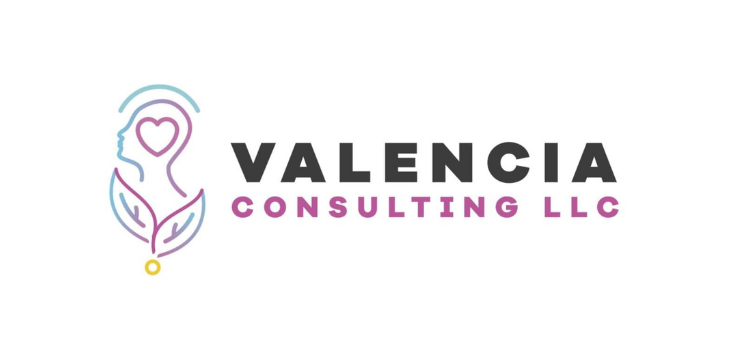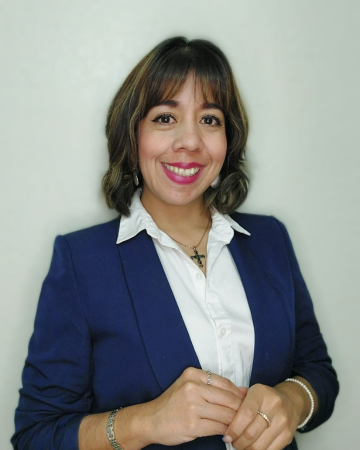
Valencia Consulting
Mental Health Advocate from Mexico Starts a Business to Shine Light on Emotional Wellness Among Spanish-Speaking Communities and Entrepreneurs

Veronica Valencia is on a mission to impact lives by raising awareness for the importance of mental wellness among Spanish-speaking communities. She began her career providing counseling services in Mexico, where she first earned her Bachelor's degree in Psychology. When she moved to the U.S., she continued her education, earning a Master’s degree in Psychology and supporting clients through nonprofit organizations. She realized that her best path to raise awareness for mental health on a broad scale, and especially among Spanish-speaking populations, was to start her own consulting business. Veronica formed Valencia Consulting LLC to bring mental health and emotional wellness services to people where they are, addressing support groups, providing workshops, leading workplace training, and also seeing private clients.
Veronica has a particular interest in supporting Spanish-speaking entrepreneurs, who are wrestling with the common doubts and obstacles of starting and owning a business as well as navigating processes, policies, and resources in a foreign language. In addition, Veronica has noticed a frequent cultural stigma regarding mental health that she feels makes it particularly difficult for Spanish-speaking entrepreneurs to cope with the bumpy road to business ownership.
How It Got Started: In 2009 Veronica Valencia earned her Bachelor’s degree in Psychology while living in Mexico. With her training, she had the opportunity to practice in a variety of private and public settings, such as community centers, government agencies, clinics, and schools. She noticed a stigma about mental health, and perhaps an expectation to be okay and have everything under control. She realized that clients had to make the decision to seek help, often wondering, “Is it okay to be asking for help? Am I crazy?” She decided an important part of her practice would be to find ways to meet clients where they are, such as community settings, support groups, and other meetings or gatherings. Veronica shares, “When I speak to audiences, I make them feel seen, heard, cared for. They think, ‘I am not alone. I am not as crazy as I thought. My struggles are important.’”
When Veronica came to the U.S. she furthered her education earning a Master’s in Psychology, and she noticed a slightly different need among the Spanish-speaking community, especially as she thought about starting her own business.
“A lot of immigrants come from Latin America, and there are so many barriers. For entrepreneurs, they face many of the same challenges as U.S. citizens, wondering, ‘What if I’m not good enough,’ ‘What if I don’t get the money I need,’ ‘What if I don’t reach the right people to find the correct information,’ etc.” says Veronica. “Yet all of the resources are in English, and there is a lack of mental health support for this particular population group.”
Veronica identifies two tipping points that led her to start her own practice. First, one of her early clients after earning her Master’s degree was a couple who had seen another therapist before her. That therapist didn’t speak Spanish so there was an interpreter. Even so, it was difficult for the couple to communicate. They felt very awkward and confused as to whether and how to express their struggles to the counselor and the interpreter. They told her they didn’t feel safe. The second incident was a series of conversations Veronica had with family members and friends, and the realization that there is a definitive need for mental health care in group settings to discuss effective communication, stress management, motivation, feelings in the workplace, mindset, entrepreneurship guidance, and more.
In Mexico, Veronica was only able to practice in public and private settings, there was no space for entrepreneurs within the clinical industry. She saw an opportunity to combine her passions for mental health and people in a new venture, and she founded Valencia Consulting LLC.
How MOBI Helped: Veronica turned to the My Own Business Institute to learn the process to formally establish a business in the U.S. She said the Starting a Business course provided important information about how to set the foundations for her business and provided support along the way. In particular she said the business plan was her main struggle. “I had no idea how to write a business plan, the administrative side of my business was not a thing for me, I felt defeated. The MOBI course showed me how to create my business plan, and I used the MOBI Business Plan Template to help,” Veronica said of her experience.
Reflecting on her observations and her own entrepreneurial journey, Veronica shares this advice for other aspiring business owners: “Being an entrepreneur is a great opportunity to explore external and internal opportunities and challenges. Some people may have a difficult time taking an idea and making it come to life. It’s important for them to know, you don’t have to do it all, you don’t have to know it all. Work with a team. It might be your idea, but you are not alone. Yes, there are a lot of resources and a lot of people to help you make it a meaningful project. Even starting from zero you should give yourself a lot of credit, you may discover your coping mechanisms or difficult feelings you need to process. At the end of the day, these are positive challenges. That’s life, there are roadblocks. Learning how to overcome those challenges, questioning and exploring your internal world will help you navigate the external world as well.”
What’s Next: Veronica has big plans for the future. She is working on creating her website. “I am on a mission to impact lives through the facilitation of workshops, conferences, talks, and seminars,” Veronica shares. She is also working on developing merchandise that will promote mental health awareness and also provide a funding stream. “I have a clear goal to create merchandise with specific self-care tips, phrases, and messages in Spanish, to raise awareness that it’s okay not to be okay.” Veronica also sees an opportunity to promote self-care in public settings, with signs or interactive activities that can pose questions such as, “How are you feeling today? Choose an option.” “I want the message to be big and clear, it’s ok to reach out for help,” Veronica says.
